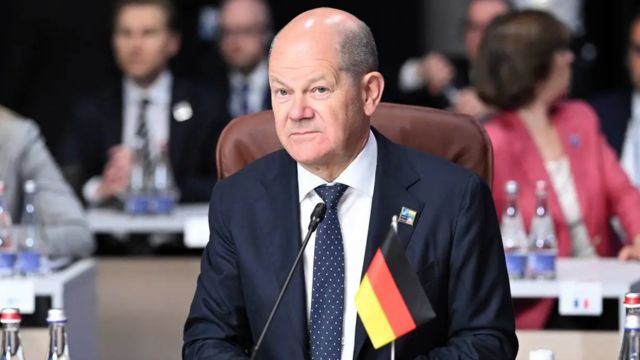German Chancellor Olaf Scholz on Friday said his government would adapt its defence budget to ensure the country achieves the NATO spending target of 2% of GDP even after a special 100 billion euro ($106 billion) defence fund has been exhausted. The German Chancellor had previously mentioned 2025 as the date for meeting this target. “We will definitely solve it in such a way that the Bundeswehr (army) gets the resources it needs – even after the special fund expires,” Scholz said in a speech about meeting the NATO target. The German leader was speaking a day after his government pledged to make the German military the “backbone” of European defence as part of a major policy shift to ramp up spending and modernise its forces following Russia’s invasion of Ukraine in 2022. Germany’s failure to meet the 2% defence spending threshold has sometimes been a sore spot for other NATO member states. In particular, the United States has raised the matter several times, where right-wing leaders including Donald Trump have accused the EU country of taking advantage of the alliance’s benefits while falling short of its expected contributions. Russia’s invasion of Ukraine last year and the ongoing war, however, has brought about a major transition in German defence policy. The country has pledged ammunition and arms to the Ukrainian military in volumes quite unthinkable as recently as two years ago. Scholz also highlighted the project known as FCAS to develop a combat jet with France and Spain as an example of closer European cooperation on defence. “In this sense, we have advanced the FCAS fighter aircraft project with France and Spain and will now also quickly advance the MGCS main battle tank project under German leadership with France,” he said. Scholz’s mention of FCAS appeared to underscore Berlin’s commitment to the project after a recent report in Britain’s The Times newspaper suggested that Germany was thinking of walking away from the deal due to disputes over design and financing.
Germany’s failure to meet the 2% defence spending threshold has sometimes been a sore spot for other NATO member states. But Russia’s invasion of Ukraine last year has brought about a major transition in German defence policy
Advertisement
End of Article


)

)
)
)
)
)
)
)
)



